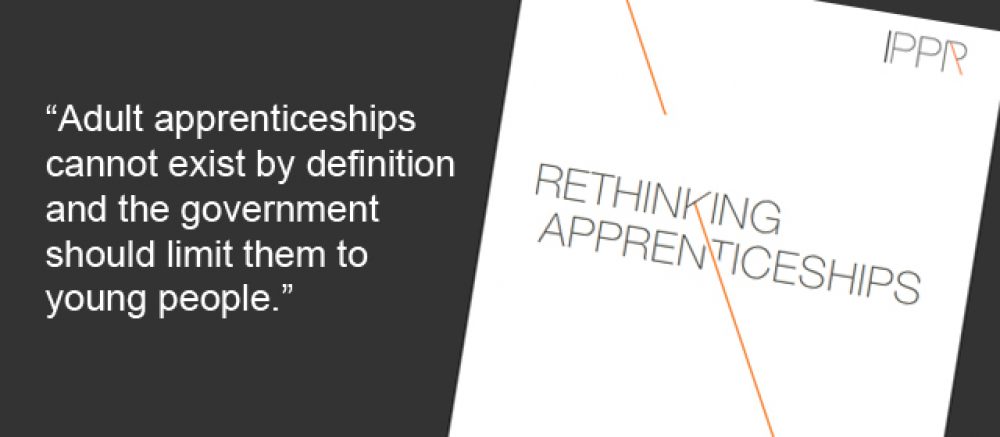Apprenticeships should be restricted to learners under the age of 25, according to researchers from the Institute for Public Policy Research (IPPR) in a new book launched today.
Proposals include increasing the funding for pre-apprenticeship training by applying an age limit to all apprenticeship starts.
Tess Lanning, a research fellow at IPPR and Tony Dolphin, IPPR’s senior economist argue that while training adults is important, it’s damaging to call it an apprenticeship.
“Increasing the number of apprenticeships that are offered to people aged 25 and over has diluted the important role that they should play in socialising young people and preparing them for the world of work,” The report states.
“Adult apprenticeships cannot exist by definition and the government should limit them to young people. Apprenticeships should not be just another form of on-the-job training; they should be something special, easing the transition of young people into work through a mix of on-the-job specific training and more general off-the-job learning.
“People who have already been in the labour market for a number of years require other types of training. There is a case for the government to create a stronger adult skills system that supports people to cope with economic change, but apprenticeships are not the appropriate vehicle.”
The pair add that pre-apprenticeship training should be used to help young people who are unemployed and “lack even the most basic skills required by employers” to get onto an apprenticeship scheme.
“The apprenticeship ‘brand’ should be reserved for young people developing the skills they need to flourish in the labour market.
“We are sceptical about the quality of some apprenticeships offered to older workers and believe they offer a poor return to the government, compared to helping young people prepare for an apprenticeship.”
‘Rethinking apprenticeships’ was launched by John Hayes, Minister of State for Further Education, Skills and Lifelong Learning at the AoC Annual Conference and Exhibition in Birmingham.
Mr Hayes has written a chapter in the book outlining new government priorities that will ensure apprenticeships are ‘no longer to be seen as the poor relation of academic study’.
The Minister states that training in new areas such as advanced engineering, information technology and the creative industries will help re-establish apprenticeships as the ‘primary form’ of practical training.
The report also says that level 2 apprenticeships need to be clearly branded as an ‘intermediate’ qualification to learners in order to encourage them to progress to higher levels.
“I want many more apprenticeships to be at higher levels, up to degree level and even above. The government has announced a higher apprenticeship fund, worth £25m, which will support up to 10,000 more advanced and higher apprenticeships,” Mr Hayes said.
Mr Hayes also said FE colleges are the ‘great unheralded triumph’ of the education system, and would be given even greater freedoms by the coalition.
“We are replacing the costly regime of centralisation with genuine devolution of power within the system.
“The government’s primary role is to create a framework that helps individuals and their employers to get the learning they want or need.
“An indispensable part of achieving this goal is removing the barriers in the way of learning providers’ efforts to respond to what their customers are demanding.”
Other contributors include Martin Doel, Chief Executive of the Association of Colleges (AoC), who published the book in partnership with the IPPR.
Mr Doel said apprenticeships should take influence from the German ‘meister’ model and teach young people generall skills, as well as English and maths at FE colleges.
“Particularly for young people, an apprenticeship’s value in the labour market lies as much in its teaching of general skills as its occupational training,” Mr Doel said.
“There is a good case for a strong core offer, delivered in partnership with colleges, for young people, not just those under 19 but perhaps up to the age of 25.
“Those aged under 19 should certainly enjoy time off-the-job for learning equivalent to that in Germany, so they can learn not just English and maths but also the generic skills that will stand them in good stead in an economy where adaptability scores highly.”
Mr Doel added that learners aged 25 and above need a completely different apprenticeship model in order to become a ‘meister’, or a highly skilled craftsman or woman.
“Apprentices aged 27 may have been working for a decade, and have gained many of the personal, learning and thinking skills that are so essential in the SASE framework.
“They may want, not just level 3 courses, but highly advanced level 4 and 5 apprenticeships where they either learn the skills needed to become a manager or to become what the Germans would call a meister.”
Mr Doel added that a qualification equivalent to the meister currently does not exist.
“It is something akin to the master craftsman diploma that we should seek to incorporate within our apprenticeship programme, recognising it as an alternative to the management route,” Mr Doel said.



I think this view ignores the fact that many of the 25+ people who apply for apprenticeships do not have the previous work experience and necesary employability skills that seems to be taken for granted; so creating a master craftsman diploma as an alternative route for post 25 yr olds may not be a realistic option for many. I strongly agree with the suggestion that pre-apprentice training should be available for those that “lack even the most basic skills required by employers” – however this should available regardless of age.